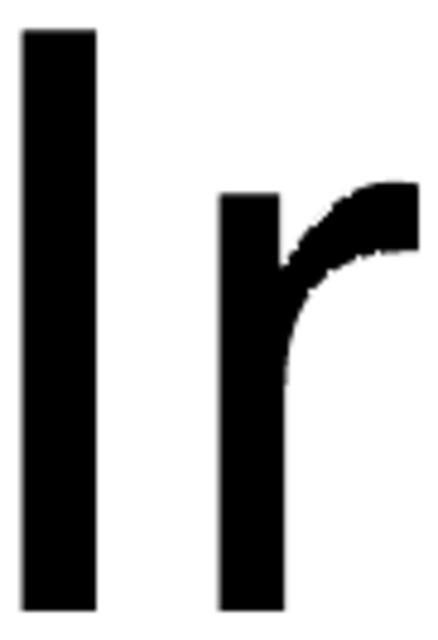GF98486982
Iridium
foil, 25x25mm, thickness 0.15mm, as rolled, 99.9%
Sinónimos:
Iridium, IR000215
Iniciar sesiónpara Ver la Fijación de precios por contrato y de la organización
About This Item
Fórmula empírica (notación de Hill):
Ir
Número de CAS:
Peso molecular:
192.22
Número MDL:
Código UNSPSC:
12141720
ID de la sustancia en PubChem:
NACRES:
NA.23
Productos recomendados
Análisis
≥99.9%
formulario
foil
fabricante / nombre comercial
Goodfellow 984-869-82
resistividad
4.71 μΩ-cm
bp
4130 °C (lit.)
mp
2450 °C (lit.)
densidad
22.65 g/cm3 (lit.)
cadena SMILES
[Ir]
InChI
1S/Ir
Clave InChI
GKOZUEZYRPOHIO-UHFFFAOYSA-N
¿Está buscando productos similares? Visita Guía de comparación de productos
Descripción general
For updated SDS information please visit www.goodfellow.com.
Información legal
Product of Goodfellow
Elija entre una de las versiones más recientes:
Certificados de análisis (COA)
Lot/Batch Number
Lo sentimos, en este momento no disponemos de COAs para este producto en línea.
Si necesita más asistencia, póngase en contacto con Atención al cliente
¿Ya tiene este producto?
Encuentre la documentación para los productos que ha comprado recientemente en la Biblioteca de documentos.
Soo Bong Han et al.
Chemical communications (Cambridge, England), (47)(47), 7278-7287 (2009-12-22)
Existing methods for enantioselective carbonyl allylation, crotylation and tert-prenylation require stoichiometric generation of pre-metallated nucleophiles, and often employ stoichiometric chiral modifiers. Under the conditions of transfer hydrogenation employing an ortho-cyclometallated iridium C,O-benzoate catalyst, enantioselective carbonyl allylations, crotylations and tert-prenylations are
Paolo Tosatti et al.
Organic & biomolecular chemistry, 10(16), 3147-3163 (2012-03-13)
Since their discovery in 1997, iridium-catalysed asymmetric allylic substitutions have been developed into a broadly applicable tool for the synthesis of chiral building blocks via C-C and C-heteroatom bond formation. The remarkable generality of these reactions and the high levels
Stephen J Roseblade et al.
Accounts of chemical research, 40(12), 1402-1411 (2007-08-04)
Asymmetric hydrogenation is one of the most important catalytic methods for the preparation of optically active compounds. For a long time the range of olefins that could be hydrogenated with high enantiomeric excess was limited to substrates bearing a coordinating
Low-valent ruthenium and iridium hydride complexes as alternatives to Lewis acid and base catalysts.
S Murahashi et al.
Accounts of chemical research, 33(4), 225-233 (2000-04-25)
The discovery of a new chemical reaction often leads to new applications and new chemical principles. Low-valent ruthenium and iridium hydride complexes are highly useful redox Lewis acid and base catalysts. Nitriles are activated by these catalysts and undergo reactions
Veronica Marin et al.
Chemical Society reviews, 36(4), 618-635 (2007-03-28)
The need for novel materials with luminescent properties and advanced processing features requires reliable and reproducible synthetic routes for the design of suitable materials, such as e.g. polypyridyl ruthenium(II) and iridium(III)-containing polymers. The most popular ligand for those purposes is
Nuestro equipo de científicos tiene experiencia en todas las áreas de investigación: Ciencias de la vida, Ciencia de los materiales, Síntesis química, Cromatografía, Analítica y muchas otras.
Póngase en contacto con el Servicio técnico